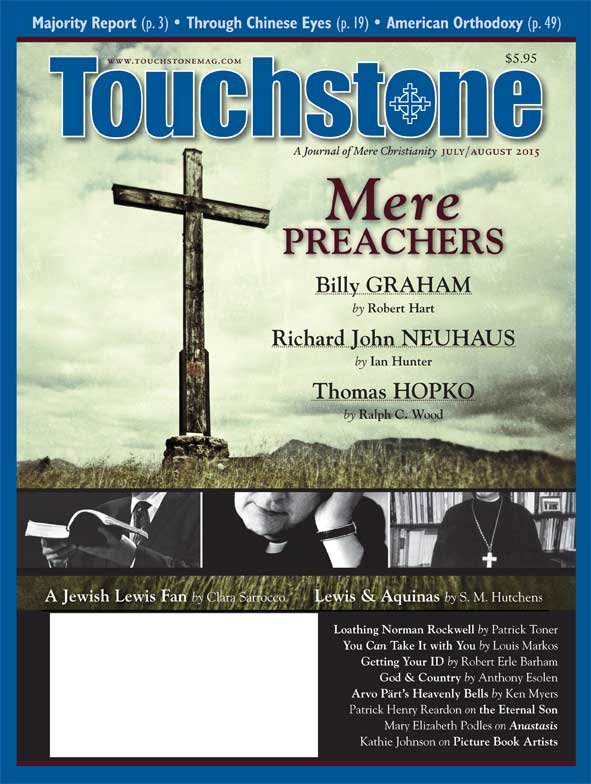View
Higher
End Gifts
Louis Markos on How You Can Take It with You
As they wend their way down into the fifth circle of the inferno, Dante and Virgil catch their first sight and smell of the river Styx. In the annals of Greek mythology, Styx is usually described as a swiftly flowing stream, but in Dante's conception of the underworld, it becomes a black and stinking marsh. It becomes, in short, an appropriate dwelling place for the souls of the sullen. Virgil explains:
". . . now you may see
the souls of those whom wrath has overcome,
and you should take it for a certaintyThat underwater here are souls who sigh
and make the river bubble to the top,
as you may see wherever you turn your eye.Stuck in the mire they say: 'Sullen we were
up in the sweet air gladdened by the sun,
bearing a sluggish smoke within our hearts.Now we are sullen in this black bog here.'
Such is the hymn they gargle in the throat.
They cannot get the words out whole and clear."(Canto VII; translator: Anthony Esolen)
Such is the eternal state of those who squandered their gifts and wasted their talents, who lived empty, meaningless lives of ignorance and sloth. Though they spent their mortal years in the constant presence of God's wisdom, grace, and love—symbolized throughout the Divine Comedy by the sun—they neither matured nor bore fruit. Rather, like Esau the buffoon, who bartered his birthright for a mess of pottage, they traded in their God-given potential for a little sleep, a little slumber, a little folding of the hands. Sluggish, torpid, apathetic, they resemble nothing less than human extensions of that foul-smelling, stagnant bog that will be their home for eternity.
In many ways, the sullen, poised as they are in the very middle of the inferno, may serve as a perfect metaphor for the entire realm of hell. For Dante, hell is not so much a place of pain as it is a place of sadness, waste, and futility. The inferno is the sewer of the universe; all the refuse of the world, the guilt and the sin, the broken dreams and blighted hopes, runs ever downward until finally it collects in the bowels of that great abyss that stretches and yawns just beneath our feet. Indeed, Styx itself, like all the rivers of the inferno, is the product of those bitter tears of humanity that have flown and continue to flow from the decayed and decadent kingdoms of our world (Canto XIV).
In one way or another, all the souls in the inferno have wasted their gifts; like the foolish servant in the parable, they made the cowardly and despairing choice to bury their talent underground, and by so doing, both violated their master's trust and frustrated their own purpose and worth.
Louis Markos , Professor in English and Scholar in Residence at Houston Baptist University, holds the Robert H. Ray Chair in Humanities. His 19 books include Lewis Agonistes; Restoring Beauty: The Good, the True, and the Beautiful in the Writings of C. S. Lewis; On the Shoulders of Hobbits: The Road to Virtue with Tolkien and Lewis; and From A to Z to Narnia with C. S. Lewis.
subscription options
Order
Print/Online Subscription

Get six issues (one year) of Touchstone PLUS full online access including pdf downloads for only $39.95. That's only $3.34 per month!
Order
Online Only
Subscription

Get a one-year full-access subscription to the Touchstone online archives for only $19.95. That's only $1.66 per month!
bulk subscriptions
Order Touchstone subscriptions in bulk and save $10 per sub! Each subscription includes 6 issues of Touchstone plus full online access to touchstonemag.com—including archives, videos, and pdf downloads of recent issues for only $29.95 each! Great for churches or study groups.
Transactions will be processed on a secure server.
more from the online archives
calling all readers
Please Donate
"There are magazines worth reading but few worth saving . . . Touchstone is just such a magazine."
—Alice von Hildebrand
"Here we do not concede one square millimeter of territory to falsehood, folly, contemporary sentimentality, or fashion. We speak the truth, and let God be our judge. . . . Touchstone is the one committedly Christian conservative journal."
—Anthony Esolen, Touchstone senior editor











